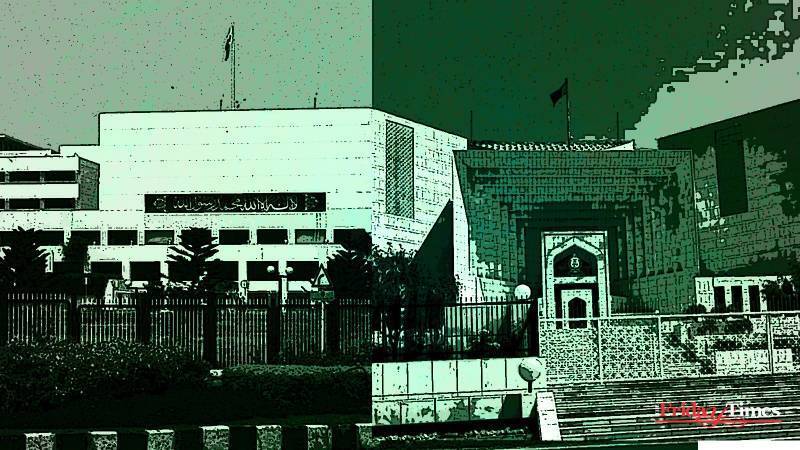
Many breathed a sigh of relief when the idea of the Federal Constitutional Court (FCC) lost to the formation of a ‘Constitutional Division’ within the Supreme Court. Is it really a good fallback position? Let’s see!
One, the draft 26th Constitutional Amendment, in the proposed Article 191A(1), envisages constitutional benches of “Judges of the Supreme Court” as may be nominated by the Judicial Commission of Pakistan (JCP) “for such term” as JCP may determine. It has a proviso that such benches may comprise judges equal in number from the provinces. The following needs consideration on this behalf:
- Given the total strength of the apex court (seventeen) and the minimum member requirement and appeal provisions under the Supreme Court (Practice and Procedure Act), 2024 (PPA), there cannot be more than three Constitutional Benches at a time.
- The truly representative federal character of such benches, that our elected representatives set out to deliver, cannot see the light of day unless we have a minimum of three judges from each province, including the Islamabad Capital Territory (ICT), at the apex court. If history and mindset at the apex court or within the ruling elite is a lesson, this is not happening.
- The Islamabad High Court is treated worse than a stepchild when it comes to representation at the Supreme Court. Technically, ICT is a ‘province’ but it’s high time its residents are distinctively recognised and represented in all constitutional institutions. At least two generations are now born in ICT. Punjab or Khyber Pakhtunkhwa (KP) ought not to be allowed to claim it as their progeny and continue to deprive its residents in this regard.
Second, the proposed Article 191A(2) provides that the most senior judge amongst nominees of the Constitutional Bench shall be the Presiding Judge while proposed Article 191A(3) carves out jurisdiction of these benches such that all matters under Articles 184 and 186 will be heard by no other bench of the Supreme Court (that is: (i) the original jurisdiction to pronounce declaratory judgments in respect of any dispute between provincial and federal governments, (ii) the all too well-known jurisdiction involving question of public importance with reference to the enforcement of Fundamental Rights, and (iii) the advisory jurisdiction to render opinions to the President on any question of law which he considers of public importance). In this regard;
- It is not clear what will be the fate of civil, criminal, or company petitions (hundreds if not thousands) decided under these specific jurisdictions that involve interpretation of the Constitution.
- Apparently, in a civil, criminal, or commercial case, where any provision of law is challenged (quite a usual practice), there would be two appeals: one before the Constitutional Bench and the other to the appellate bench because these were not initiated under Article 199 but embodied collateral attack, which could only be dealt with by the High Court because it possesses distinct powers under Article 199.
- Or, will the constitutional question be bifurcated itself the High Court and heard separately because appellate remedies lie in two different a at the apex court?
- Whether the benches at the Supreme Court will consider the matter concurrently or sequentially – with the Constitutional Bench determining the vires of the law and the other appellate bench proceeding to decide it on merits or will it wait for the decision of the constitutional question?
We have seen the disastrous effects of splitting maintainability/stay applications by different courts/judges under the undone amendments in the Civil Procedure Code but somehow, we now want to experiment with the same failure at a grander stage. Bravo!
Will Bilawal Bhutto-Zardari, who spearheaded the effort, accept and remain satisfied with the “moth-eaten” FCC or consider it a springboard to realise it at a later date? Some stars foretell that the FCC will become a reality one day, not because it is needed but because there is more than meets the eye.
Third, the proposed Article 191A(4) provides that the Constitutional Bench that will hear designated appeals (under 185(3) from matters agitated under Article 199 and not others) will be appointed by a new committee comprising “the Presiding Judge and the next two most senior Judges from amongst the Judges nominated under clause (1) – that is, the Constitutional Bench. This is intriguing in its peculiar manner:
- Does the above not effectively repeal the PPA to the extent it provides that a new committee will form the Constitutional Benches?
- The committee under PPA, if not identical to the one proposed here (a possibility), will form benches for all other matters whereas Constitutional Benches will be formed by the one under the proposed Constitutional Division.
Assuming the 26th Constitutional Amendment goes unchallenged (very hard to digest), the above is just a flavour of incongruities or jurisprudential conundrums that will arise from the ashes of the FCC defeat.
Will Bilawal Bhutto-Zardari, who spearheaded the effort, accept and remain satisfied with the “moth-eaten” FCC or consider it a springboard to realise it at a later date? Some stars foretell that the FCC will become a reality one day, not because it is needed but because there is more than meets the eye. For instance: is the ‘Presidential’ form of government somewhere we can’t see?
Who shall live to see the day?

